1930's actress talks movies
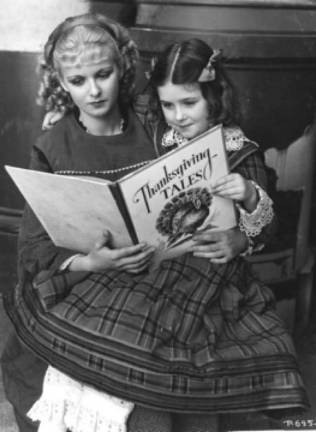
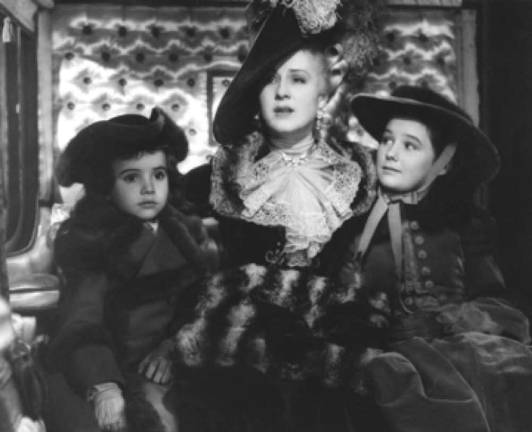
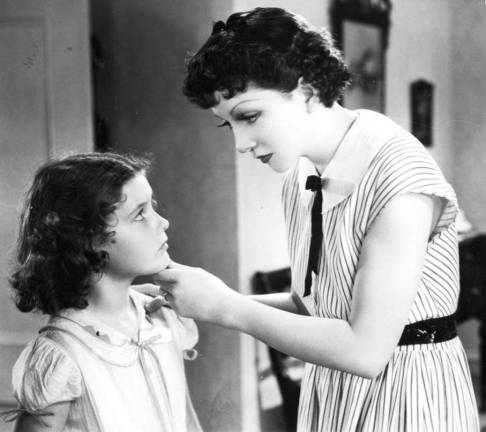
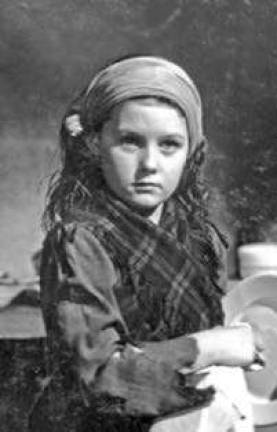
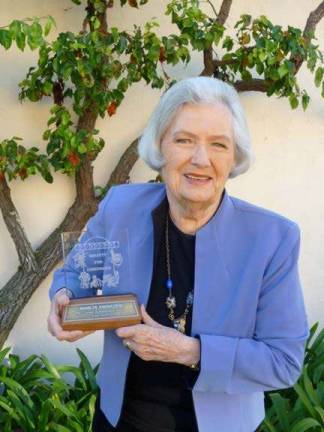
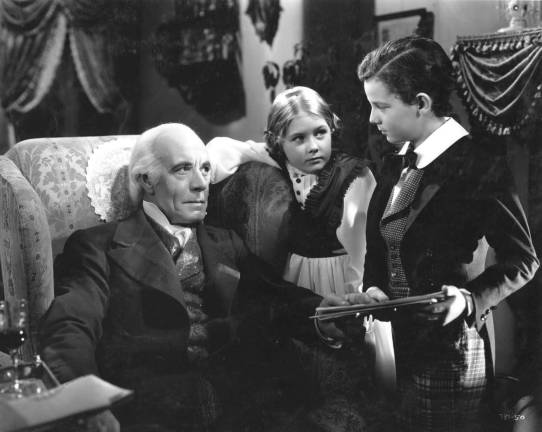
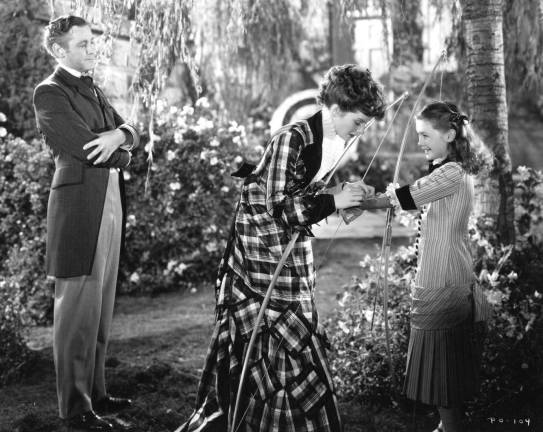
How many actors or actresses can say they were in six films nominated for the best picture Academy Award between 1930 and 1940?
Just one. Marilyn Knowlden.
The former child actress, who turns 89 this Tuesday, has a vivid memory of those years and can still sing as she did on a recent phone interview from her home in California.
With the recent passing of Hollywood legends Mickey Rooney and Shirley Temple, Knowlden is one of the last links to pre-war Hollywood where everything seemed possible and dreams were captured for eternity.
Knowlden acted alongside Hollywood royalty like Katherine Hepburn, Claudette Colbert, Bette Davis, Fredric March, Clark Gable, Greta Garbo, Joan Bennett, W.C. Fields, Tyrone Power, Wallace Beery, Paul Muni and Norma Shearer.
She played the crucial roles of children in “Marie Antoinette,” the Academy Award nominated films “Les Miserables,” “David Copperfield” and “Imitation of Life.” She had small roles in the Oscar-winning “Little Women” (1933) and Oscar-nominated “All this and Heaven too.”
Her picture as the young Cosette still adorns the DVD cover of Les Miserables for both the original and 1950's version.
Her career began at the age of 4 when she went to Hollywood after a dance teacher encouraged her.
She almost didn't survive.
As a passenger in a car driven by her father, she escaped serious injury after an accident on the Hollywood lot. She was attended to by Dolores Costello, silent era screen siren, the wife of John Barrymore and future grandmother of Drew Barrymore.
“She brought me into the dressing room and took care of me,” Knowlden recalled.
“Talk about a Hollywood situation.”
While Marilyn suffered a scrape and a bump on her forehead, her mother had three broken ribs and a broken collarbone.
That was the beginning of a successful career in the movies. Her dad “fell in love with Hollywood” and left his career as an attorney to work as her agent.
One of her earliest memories is watching the Marx Brothers make a movie. She remembers a director introducing her to the brothers and Chico played the piano for her.
“It was a very innocent time,” she recalled.
“Like a kid being in the talent show.”
In the 1930's Knowlden spent six weeks at MGM's one-room “Little Red Schoolhouse,” where Judy Garland and Mickey Rooney were studying. The two were older than her and she didn't get to know them.
“They were just anxious to get out of school,” she said.
Her book “Little Girl in Big Pictures” captures her time acting with some of the biggest names in show business.
Her book tells her life story with striking clarity, mixing in stories with poems.
Knowlden never kept a diary. Her mother kept a scrapbook with articles and pictures.
At the age of five, she acted in “Susan Lenox,” a 1931 movie with Clark Gable and Greta Garbo but her scenes were cut. She still has pictures.
Garbo, perhaps the most famous actress of the period, introduced her to Gable.
“He looked like my father. He had big ears,” she recalled.
Knowlden remembers Garbo telling her “Italy is shaped like a boot.”
Two years later she had a role in the Oscar-winning “Little Women.” While her role was small, she made a large impression on George Cukor.
“The important thing was I met George Cukor. He liked me.”
Cukor would cast her in the 1935 classic “David Copperfield,” a breakout role which led to other parts.
“Little Women” featured two great actresses in Katherine Hepburn and Joan Bennett.
Bennett, one of the era's most stunning beauties, read a book to Knowlden off-set. Bennett was in her early 20's but had already married, been a mother and divorced.
“She was very pleasant. A very nice lady,” Knowlden said.
“Little Women” was the first of three pairings between Knowlden and Hepburn. The others were “Morning Glory” (1933) and “A Woman Rebels” (1936).
In “A Woman Rebels,” Knowlden played Hepburn's illegitimate daughter.
“I thought she was my aunt,” Knowlden joked.
Hepburn disliked signing autographs but gladly signed one at Knowlden's request.
Knowlden collected autographs from her co-stars over the years in a scrapbook.
After “Little Women,” eight-year-old Knowlden got to play cards with the vivacious Claudette Colbert in “Imitation of Life” in a significant role as her graceful daughter.
“She was so nice,” Knowlden said.
Knowlden said that Colbert had a “certain independence” and “liveliness” about her.
She remembers looking in the mirror together with Colbert, and the two laughed.
“She had a lot of spunk,” Knowlden said.
Years later, Knowlden went to visit Colbert when she was acting on stage.
Colbert asked about her mother, whom she remembered.
In “David Copperfield,” based on the Charles Dickens novel, Knowlden played the role of young Freddie Bartholemew's future love interest.
As the daughter of Lewis Stone, she enters the film playing a piano during an important scene with Stone and Bartholemew. Her father initially was going to tell Cukor that his daughter didn't play piano but she insisted. Knowlden could in fact play the piano.
“I pleaded with my mother to teach me,” Knowlden said. Marilyn had learned on a grand piano that somebody had left in her family's apartment.
She was given a Beethoven manuscript by the studio to practice.
Beethoven “was way beyond my ability,” Knowlden said. But Knowlden was proficient at the piano and when the scene was shot, she actually played the tune that can be heard on the movie.
Knowlden was on such a role in the mid 1930's that a doll was made of her.
Les Miserables
Her most memorable role was in “Les Miserables (1935),” one of the greatest movies and stories.
“It was just a marvelous experience for me,” Knowlden said.
Her performance as the young “Cosette” is one of the most emotional parts of the film. She was paired with Fredrich March, one of the era's top leading men.
Knowlden adored March and is her favorite actor to have worked with.
“He was so good to me,” Knowlden said.
“He had a girl my age…we had fun. I was like a co-star,” she said.
“I called him papa.”
“He was my friend,” she said.
The director Richard Boleslawski “helped me more than any other director,” Knowlden said. He prepared her for the emotions of each scene.
Off screen, she danced with Charles Laughton, who played the brooding Inspector Javert.
Marilyn didn't have scenes with him but Boleslawski brought her to watch Laughton play the fearsome role during his sewer scenes.
Laughton came to her set and the two danced.
“He wore these hip length boots,” Knowlden recalled.
“I had wooden shoes on… I taught him a wooden shoe dance,” she said.
“He was very cute with me,” she said. “He was warm and delightful.”
Knowlden and March played together again the next year in Anthony Adverse, a film also starring Olivia De Havilland. The film was directed by the legendary Mervyn LeRoy, who guided the production of The Wizard of Oz three years later. She remembers a big to-do on the set about a horse LeRoy was racing. LeRoy was a racing enthusiast who helped build the now defunct Hollywood Park.
In “Rainbow in the River” (1936), the star was nine-year-old Bobby Breen.
“We had a crush on each other,” she recalled.
He “automatically turned my head,” Knowlden recalls.
The 10-year-old Marilyn turned away when he tried to kiss her in the dressing room as her mother taught her.
They spoke again a few years ago.
“You rejected me,” he told her. She sent him her book where she acknowledged being attracted to him.
Marie Antoinette
She later got a kiss from Norma Shearer who was known as the Queen of MGM. Shearer played her mother in the MGM epic “Marie Antoinette” (1938) one of the era's biggest productions.
Shearer soaring, dynamic, tearful and emotional performance as Antoinette earned her an Academy Award nomination.
“I could never figure out how she was able to cry so easily,” Knowlden said.
Knowlden believes Shearer's tears in the movie flowed so naturally because her real life husband, MGM boss Irving Thalberg, had recently died.
“She was mourning his death.”
She has an autographed picture from Shearer in her scrapbook with the inscription “to remind you of the good old days at Versailles.”
Knowlden remembers the palace of Versailles which was recreated in grandiose fashion.
“She was a darling with us,” Knowlden said.
At lunch, there would be a surprise, Knowlden recalled. Once, she gave Knowlden a bracelet.
“We loved her,” she said.
Scotty Beckett played her younger brother. He died young after substance abuse issues.
“I loved Scotty Beckett,” Knowlden said. “He was very cute.”
The biggest grossing star in the 1930's was Shirley Temple. They were in two movies together.
“We had a lot of fun on “As the Earth Turns,” Knowlden said.
Knowlden was eight and Temple was six.
They also acted in “Just Around the Corner” (1938).
She called Temple a “serious actress.”
Temple's mother didn't allow Temple to mingle with the other children, Knowlden said.
Knowlden didn't become close with the children she acted with since she was not a contract player, worked at different studios and attended public schools.
Knowlden said she never had a bad experience in Hollywood…except once as a young child when a director tried to make her cry for the camera by saying her mother left and wasn't returning. Knowlden didn't believe him though it was traumatic enough that her mother didn't leave her alone on set for years.
Her last movie on screen was “The Way of All Flesh.”
She recalls actress Gladys George telling a racy story on the set. Marilyn, who was 14, didn't know what it was about. George asked Marilyn how old she was and then apologized.
After studying music in college, she left early to marry a military man.
She followed him on tours to Asia, helping in the rebuilding effort.
“It was a marvelous experience,” she said.
They divorced, but raised three children and a foster daughter. She also has numerous grandchildren and great-grandchildren.
“I was fortunate for the quality of the films I was in,” Knowlden said.
One may wonder why Knowlden didn't pursue Hollywood after college and marriage.
Knowlden has no regrets.
“I think it was great just living a normal life.”
“I had wonderful experiences,” Knowlden said.
“I was truly blessed.”
She is proud of the musicals she wrote, sang and acted in at playhouses for decades after raising her children, including writing songs for a version of Alice in Wonderland. She enjoys playing the piano and singing in the choir of her retirement home where she is proud to say she lives in good health.
“I am very lucky that I got my shows produced,” she said.
She treasures a lifetime achievement award she received at the 2010 Cinecon Classic Movies Festival.
“I'm doing very well,” she said.
On May 11, Knowlden celebrated her 89th birthday.
During the interview, Knowlden breaks out into song.
“Stage mothers,” Knowlden sings.
“In all of my bad dreams, I fight off the schemes,” she belts in fine tune.
“I love to sing,” she says afterwards.